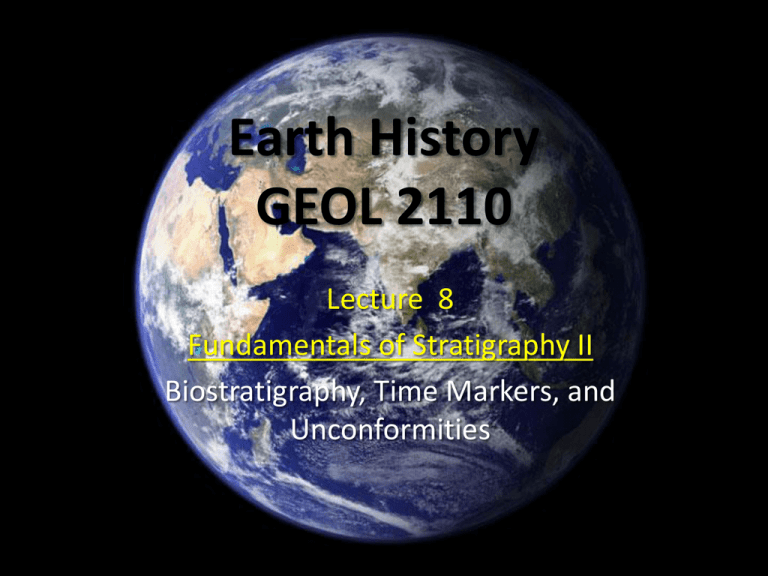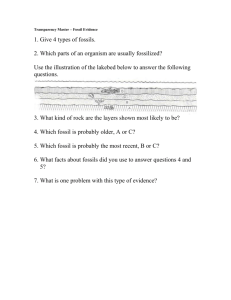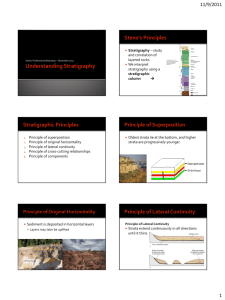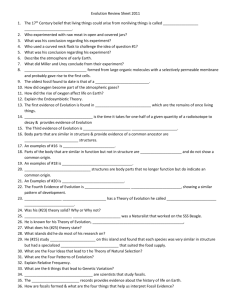Fundamentals of Stratigraphy II
advertisement

Earth History GEOL 2110 Lecture 8 Fundamentals of Stratigraphy II Biostratigraphy, Time Markers, and Unconformities Biostratigraphy A biostratigraphic unit is a body of rock that is defined or characterized by its fossil content. A fossil zone (or biozone) is an interval of strata characterized by a particular index fossil. The best index fossils are those that evolve rapidly and were not sensitive to the sedimentary environment (flyers and floaters) Index Fossils and Sedimentary Facies Good Index Fossil Cephlapods – Rapid evolving Floaters Poor Index Fossil Brachiopods – Slow evolving Sand burrowers Index Fossils and Sedimentary Facies Faciesdependent Faciesindependent Best Ever! Index Fossils Conodonts Eel-like creatures with hard “teeth and jaw” parts; Existed Late Cambrian (495 Ma) to Late Triassic (200 Ma) Graptolites Planktonic colonial zooids that floated in the oceans (“ocean beehives”) Existed from Ordovician (490 Ma) to Devonian (419 Ma) Biozones – Formations of Biostratigraphy Regional Time Markers Volcanic Ash Eruptions Long Valley Caldera 700,000 yr Mt Mazama Eruption 6,500 yr Global Time Markers Meteor Impacts K-T Boundary mudstone-impact layer (Ir anomaly) K-T impact site The 1.85 Ga Sudbury Impact The First Major Extinction Event ?? Iron Formation Breccia Accretionary Lapilli And you thought you were having a bad day… CALCULATED ARRIVAL TIMES FOR EFFECTS AT GUNFLINT LAKE (480 miles from Sudbury Impact) Meteorite.org, Pangea International, Inc 1) ~13 seconds—Fireball (thermal radiation=3rd degree burns; 50 minutes) 2) ~2-3 minutes—Earthquake (magnitude >10 at Sudbury, 1000X Haiti) (New data estimates magnitude 13 at Chicxulub) 3) ~5-10 minutes—Airborne ejecta arrives (~1-3 m thick , fragments < 1 cm) 4) ~40 minutes—Air blast (compression wave, wind speeds >1400 mph) 5) ~1-2 hours—Tsunami (the first of several?) 6) Post-impact environmental changes (duration and magnitude? Global?) www.lpl.arizona.edu/impacteffects Global Time Markers Magnetic Reversals ODP site 1149 Global Time Markers Climate Change A typical deep sea sediment core record of ∂18O in foraminifera shells Unconformities Gaps in the Geological Record Siccar Point, Scotland Utah Types of Unconformities Nonconformity – Sedimentary/volcanic strata resting on intrusive or metamorphic rocks Angular Unconformity – Relatively flat-lying strata resting on steeply-dipping strata Disconformity – Strata resting conformably on other strata across a significant time gap Creating Unconformities Nonconformity Angular Unconformity Grand Canyon Stratigraphy Unconformities related to Regression - Transgression Disconformity Paleozoic Formations of the Upper Midwest The Jordan Sandstone Disconformity Oneota Dolomite Jordan Sandstone Ordovician Cambrian Missing Fossils Gaps in the Minnesota Timescale Global Unconformities Ordovician Global Unconformities at the Edges of the Continents Reading Time in Strata Next Lecture Absolute Dating of the Earth Quiz – Chapters 4 & 5





